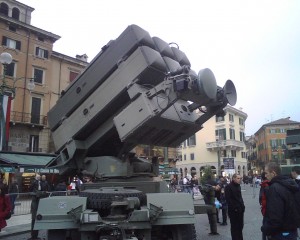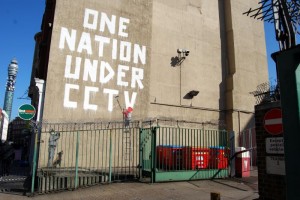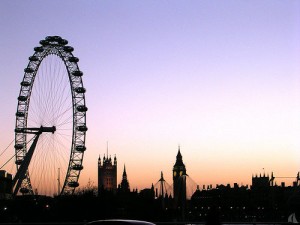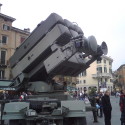Typhoon fighter jets, snipers in RAF helicopters, Royal Navy assault ships, tens of thousands of military personnel, crowd surveillance drones and missile systems on top of apartment blocks. Welcome to London 2012. Welcome to the largest mobilisation of military in this country since the end of WWII. Beyond the white elephant concerns of an Olympic budget that will run into the tens of billions during a period of deep economic calamity, London is finding itself at the centre of a debate that polarises people like few others. Are we entering into the next phase of a forthcoming police state, or are these measures an appropriate and ‘benign’ response to the socio-political landscape of the 21st century?
The topic is of extraordinary depth, and just getting one’s head around the true scope of the security planning for the London 2012 Olympics – not to mention the transportation, service, medical, accommodation, and entertainment logistics – is a difficult task. I certainly don’t envy those people whose job it is to ensure the smooth sailing of such a complicated event. Those likely to receive little credit post-fact as politicians line up one behind another to proudly claim as much of the limelight as they can; and those who would also, were anything to go wrong, be immediately thrown to the lions without a moment of hesitation. But if you have a tendency to worry about the erosion of civil liberties, the encroachment of surveillance culture on personal privacy, or the encouragement of a state of general social malaise and anxiety, the manner in which the security of this spectacle is being planned and implemented cannot help but raise a great deal of concern.
 One of the most contentious issues at the moment are plans to install several surface-to-air missile batteries on top of residential blocks in heavily populated areas. This aspect of the master plan are being put in place for one reason alone – a 9/11 style plane hijacking. They serve no other purpose, and cannot be used for any other situation, then for this single possibility of terrorist attack which has not been witnessed anywhere in over a decade. Residents were not consulted on the project, and have been all but ignored by the Ministry of Defence when raising their concerns.
One of the most contentious issues at the moment are plans to install several surface-to-air missile batteries on top of residential blocks in heavily populated areas. This aspect of the master plan are being put in place for one reason alone – a 9/11 style plane hijacking. They serve no other purpose, and cannot be used for any other situation, then for this single possibility of terrorist attack which has not been witnessed anywhere in over a decade. Residents were not consulted on the project, and have been all but ignored by the Ministry of Defence when raising their concerns.
For obvious reasons, they drastically increase the possibility of tragic accidents or even targeted attacks. Not to mention the fact that blowing up an aircraft with missiles over a densely populated area will still cause significant amounts of damage over a very large footprint. Yes, they are only to be used as a ‘measure of last resort’ – but the circumstances in which they could even be used are so mind-boggling remote as to question the professional integrity of those advising they be put in place at all.
Let me get one thing perfectly clear, I think it is important to be vigilant and concerned about the safety and security of an event of this magnitude. There is certainly a need for a much more concentrated police force, including those with specialist capabilities and intelligence networks, to be present and working towards the safety of all those who partake in this occasion. What I question is the extent to which this needs to be an overt display of military dominance and ‘national security’ – a tactic which has roots in fear-mongering, private security consultancies and over-bloated financial budgets.
Interestingly, we have recently seen the release of the independent review by David Anderson QC entitled The Terrorism Acts in 2011. This report calls for a scaling back of current UK counter-terrorism laws in a manner that is proportionate to the risk faced, which is currently at significantly lower levels than it has been over the past decade. The current approach “at times gives excessive weight to the idea that ‘terrorism is different’, losing sight of the principle that terrorism is above all crime…Elements of it have been conceived and applied with excessive enthusiasm.”
Thankfully, the report also goes on to state that in many instances there has been more restraint shown then might have been otherwise anticipated, and that there are adequate parliamentary checks and balances in place. It finishes with the words: “Once the unprecedented counter-terrorism challenge posed by the London Olympics is over, I look forward to further discussions concerning the desirability and feasibility of change.”
These closing words are of particular interest to me because of a recent tangential experience. I am a registered participant of YouGov polls. They are something that helps determine the political and media reasoning of modern society, and I would recommend everybody sign up, sit the surveys, and contribute in a small way to these narratives. In a survey I was taking recently, amongst a lot of other random unrelated questions, were two fascinating ones which stood out in an alarming way. The first was asking about whether or not I had a favourable opinion of the security measures for the London 2012 Olympics (with specific reference to a number of initiatives, such as the missile batteries and snipers); but the second was far more chilling…
It asked whether or not I had a favourable opinion of these measures being kept in place after the Olympics had finished in order to ensure ongoing security.
 Excuse me, what? I’ll never know who was asking the question (and it’s quite likely it was a journalistic survey), but the fact remains that the largest political polling organisation in this country was commissioned to ask what we think about the militarisation of London being perpetuated beyond the specific circumstances of the London 2012 Olympics.
Excuse me, what? I’ll never know who was asking the question (and it’s quite likely it was a journalistic survey), but the fact remains that the largest political polling organisation in this country was commissioned to ask what we think about the militarisation of London being perpetuated beyond the specific circumstances of the London 2012 Olympics.
I don’t need to say anything more on the issue, but for those who are supporting the measures it’s important to ask yourself whether you would be happy were they kept in place indefinitely. Keep in mind also that many of the projects, such as a drastic increase in surveillance-related technology, will definitely be kept in place.
The other aspect of the independent report that I want to pick up on is the very important insight that we feel that ‘terrorism is different’ – that it deserves a far greater immediacy of concern and response than other criminal activities, or even other non-criminal aspects of society that are harmful to our wellbeing.
Terrorist attacks are evil. They are indiscriminate acts of violence that lead to nothing but deeply scarring personal and social trauma, often without truly impacting in any major way the ideological target of the attack. But they are by no means the most dangerous aspects of our daily lives – in an immediate, risk-based sense – nor are they anywhere near the most detrimental long-term issue that we face as a collective society. Even in purely economic terms, we must seriously question the wisdom of the approach being taken that is seeing hundreds of millions of pounds being spent on ‘just in case’ strategies at a time when vital public services are having their budgets slashed.
In finding ourselves lost in a primal fear of attack from outsiders, we are neglecting many of the deep-seated and damaging social issues that have far greater impact but do not display themselves in overtly violent ways. I’ve discussed before our willingness to overlook invisible forms of violence for those which are more primal, and here we have another example of this in action. Like many others, it is one that has insidious links to the commercialisation and militarisation of modern society. A large component of the security mobilisation for the London 2012 Olympics is occurring under the advice of consultants and firms that have a vested interest in ensuring the mobilisation is as large as can possibly be managed. After all, it’s ‘better to be safe than sorry’ right? The problem is that there are indications of damning negligence and inadequacies (admittedly from the more conspiratorial minded areas of alternative media – make of that what you will) relating to the efforts of the private security firms that we are handing over hundreds of millions of pounds in contracts to.
The aspect that must not be overlooked though, even beyond the deeply concerning police-state implications and the rampant commercialisation of national security, is that we are drastically overweighting certain issues when others are more dangerous and will bring a far greater social cost during the same time period and beyond. I’d much rather see millions of pounds spent on breathalysers placed in the hands of bartenders, and definitely as activation locks on Boris Bikes! I’d rather see extensive campaigns sponsored by our government to hand out condoms; provide even more subsidised travel options so people can get home safely late at night; or ensure rent protection so that people can’t be forced out of their homes at the hands of unscrupulous landlords.
 There are countless initiatives that would have a greater impact on our collective wellbeing then bringing in as much military hardware and private security personnel as we can muster, particularly in a time when devastating budget cuts are being made to the very sectors that people depend on most.
There are countless initiatives that would have a greater impact on our collective wellbeing then bringing in as much military hardware and private security personnel as we can muster, particularly in a time when devastating budget cuts are being made to the very sectors that people depend on most.
Security is an important aspect of the London 2012 Olympics that must be given a great deal of care and attention, but chasing the spectres of our deep-seated primal fear of Otherness is not the way to ensure that this occasion is remembered as a celebration of life and creative expression. Rather it demarcates it as a projection of fear and an indication of our submission to vested interests that profit from a global culture of death and destruction.
What do you think on these issues? Make sure to keep the debate going by commenting below!





